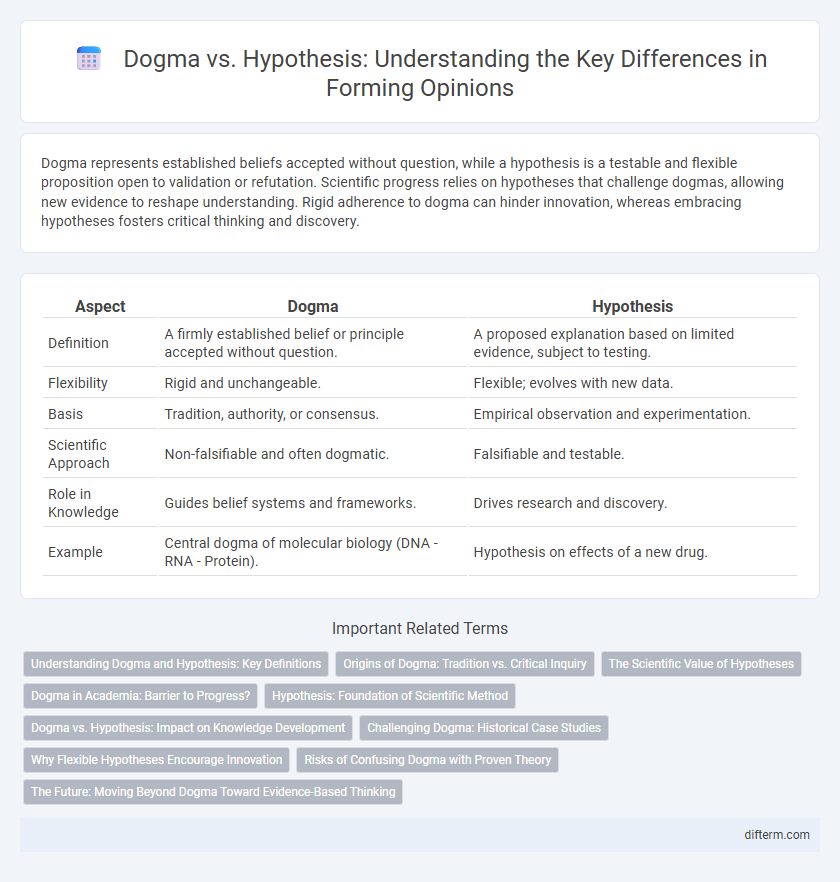Dogma represents established beliefs accepted without question, while a hypothesis is a testable and flexible proposition open to validation or refutation. Scientific progress relies on hypotheses that challenge dogmas, allowing new evidence to reshape understanding. Rigid adherence to dogma can hinder innovation, whereas embracing hypotheses fosters critical thinking and discovery.
Table of Comparison
| Aspect | Dogma | Hypothesis |
|---|---|---|
| Definition | A firmly established belief or principle accepted without question. | A proposed explanation based on limited evidence, subject to testing. |
| Flexibility | Rigid and unchangeable. | Flexible; evolves with new data. |
| Basis | Tradition, authority, or consensus. | Empirical observation and experimentation. |
| Scientific Approach | Non-falsifiable and often dogmatic. | Falsifiable and testable. |
| Role in Knowledge | Guides belief systems and frameworks. | Drives research and discovery. |
| Example | Central dogma of molecular biology (DNA - RNA - Protein). | Hypothesis on effects of a new drug. |
Understanding Dogma and Hypothesis: Key Definitions
Dogma represents established beliefs accepted as authoritative truths without requiring empirical evidence, often shaping societal or religious frameworks. In contrast, a hypothesis is a testable and falsifiable proposition formulated to explain phenomena, serving as a foundational step in scientific inquiry. Clear differentiation between dogma and hypothesis enhances critical thinking by emphasizing evidence-based reasoning over unquestioned acceptance.
Origins of Dogma: Tradition vs. Critical Inquiry
Dogma originates from unchallenged traditions that establish fixed beliefs without requiring empirical evidence, contrasting sharply with hypotheses grounded in critical inquiry and systematic testing. While dogma often relies on authority and historical continuity to maintain its influence, hypotheses invite skepticism and continuous revision based on new data and logical reasoning. This fundamental difference highlights the tension between inherited certainty and evolving understanding in the pursuit of knowledge.
The Scientific Value of Hypotheses
Hypotheses hold significant scientific value as they provide testable predictions and drive empirical research, setting the foundation for knowledge advancement. Unlike dogmas, which are rigid beliefs accepted without evidence, hypotheses encourage skepticism and continuous inquiry, essential for scientific progress. By enabling falsifiability and refinement through experimentation, hypotheses ensure that scientific understanding evolves based on observable data and reasoned analysis.
Dogma in Academia: Barrier to Progress?
Dogma in academia often hinders scientific progress by enforcing rigid adherence to established beliefs, limiting innovative research and critical thinking. This inflexibility can stifle groundbreaking hypotheses that challenge conventional wisdom and delay the acceptance of new evidence. Emphasizing hypothesis-driven inquiry promotes a dynamic, evolving understanding of knowledge, essential for academic advancement.
Hypothesis: Foundation of Scientific Method
Hypothesis serves as the foundation of the scientific method by providing testable and falsifiable predictions that drive empirical investigation. Unlike dogma, which relies on unchallenged beliefs, a hypothesis encourages continuous questioning and revision based on experimental evidence. This dynamic process allows scientific knowledge to evolve and adapt, ensuring robustness and accuracy in understanding natural phenomena.
Dogma vs. Hypothesis: Impact on Knowledge Development
Dogma enforces fixed beliefs that can limit intellectual exploration, whereas hypotheses encourage testing and revision, fostering dynamic knowledge growth. The rigidity of dogma may stifle scientific progress by discouraging questioning, while hypotheses serve as foundational tools for experimentation and discovery. Emphasizing hypothesis-driven inquiry promotes adaptability and accelerates advancements across disciplines.
Challenging Dogma: Historical Case Studies
Historical case studies reveal how challenging dogma has driven scientific progress by replacing entrenched beliefs with evidence-based hypotheses. The heliocentric model proposed by Copernicus overturned the dogmatic geocentric view, demonstrating the power of questioning accepted doctrines. Similarly, Semmelweis's advocacy for hand hygiene challenged medical dogma, drastically reducing infection rates and reshaping clinical practices.
Why Flexible Hypotheses Encourage Innovation
Flexible hypotheses encourage innovation by allowing researchers to adapt and refine ideas based on new evidence, fostering continuous exploration and discovery. Unlike rigid dogma, which confines thinking to fixed beliefs, adaptable hypotheses promote critical thinking and openness to alternative explanations. This dynamic approach accelerates scientific progress and drives breakthroughs across disciplines.
Risks of Confusing Dogma with Proven Theory
Confusing dogma with proven theory risks stagnating scientific progress by discouraging critical inquiry and open debate. Dogma, often accepted without empirical evidence, can lead to the reinforcement of misconceptions, whereas hypotheses foster experimentation and validation through observable data. Maintaining a clear distinction ensures that knowledge evolves based on reliable evidence rather than unquestioned beliefs.
The Future: Moving Beyond Dogma Toward Evidence-Based Thinking
Embracing evidence-based thinking over dogma fosters innovation and adaptability in scientific and social progress. Hypotheses, grounded in empirical data and open to revision, enable continuous learning and more accurate understanding of complex realities. Shifting focus from rigid beliefs to dynamic inquiry empowers future advancements and informed decision-making.
dogma vs hypothesis Infographic

 difterm.com
difterm.com